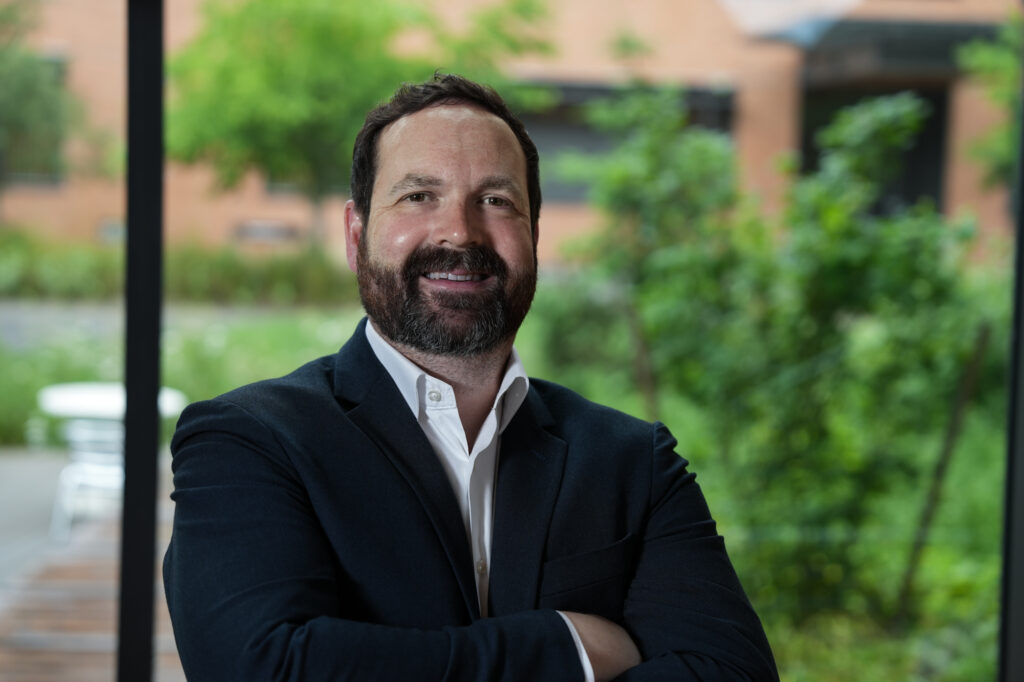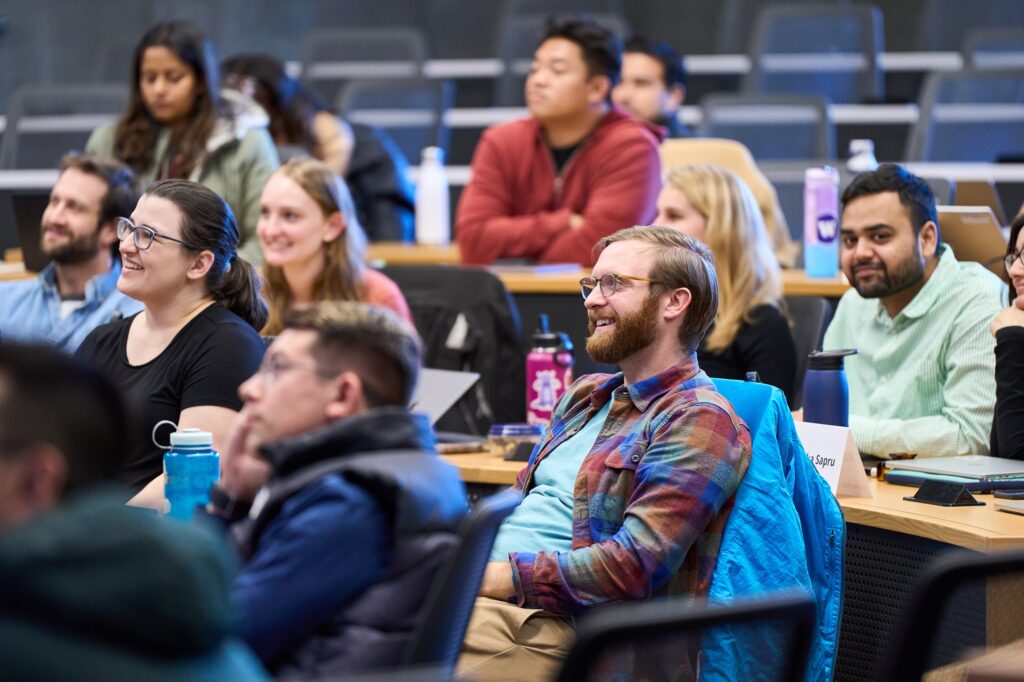
MBA Students Identify Financing Barriers for Renewable Energy Projects
At the UW Climate Risk Lab, MBA students study the connection between access to financing impacts and projects on tribal lands
How does access to financing impact whether a renewable energy project moves forward on tribal lands? That’s a question that three Foster School of Business MBA students set out to answer in partnership with Professor Phillip Bruner at the UW Climate Risk Lab.
The MBA students—Ni Zhang (MBA 2024), Kelsey Mara, and Mengyin He (MBA 2024—worked with Bruner to complete a strategic consulting project under the Service Corps program. Christian P. Phillips and Haoyu Yue of the Urban Infrastructure Lab served as advisors. The project examined how access to development finance influences the viability of renewable energy projects led by tribal organizations in the U.S.

Access to financing is vital for renewable energy projects
Sustainable finance experts agree that access to funding is critical for unlocking local capacity for ownership of renewable energy projects. Yet surprisingly, this challenge is unaddressed relative to the needs of U.S. tribes, who have historically been left out of strategic planning and decision-making in developing the energy system.
With data tools and guidance from the UW Climate Risk Lab team, the students assessed barriers to financing renewable energy projects, such as solar, wind, and geothermal. Their research focused on the commercial and industrial (C&I) scale of development (100kW-2MW), fully considering the cultural and governance considerations unique to tribal communities in the U.S. The students included data from interviews with leaders and stakeholders from federally recognized tribes and those without federal recognition (acknowledgment).
Projects range from solar to geothermal
Renewable energy development on tribal lands has significantly lagged behind projects in non-tribal areas, underscoring the need for increased support and investment. Tribal lands encompass many potential renewable energy resources, including solar, wind, hydroelectric, geothermal, and biomass. For a sense of scale, these lands hold approximately 6.5% of the country’s total technical potential for utility-scale renewable energy.
Access to infrastructure development
Today, the Bureau of Indian Affairs (BIA) recognizes 574 tribes, granting them access to federal resources. This recognition facilitates infrastructure development and investment in renewable energy technologies. Conversely, the U.S. Government Accountability Office has identified approximately 400 non-federally recognized tribal entities. These tribes fall into a funding void, unable to access federal or state resources.

Exploring tribal renewable energy projects
As a result of their study, the student team identified critical barriers to advancing renewable energy development for tribal communities. Their observations included:
1. The federal government’s historically slow pace, combined with the lack of federal recognition of some tribes, hinders access to funding and resources.
2. Internal administrative challenges within tribal governments can also delay project implementation and create uncertainty.
3. Despite recent federal initiatives, securing financing remains challenging. This is partly due to the perceived risks and legal complexities.
4. Historic disinvestment and marginalization have entrenched socio-economic disparities and continue to limit development opportunities.
Fostering collaboration between tribes and policymakers
The most impactful phase of the project was a series of interviews they conducted with tribal leaders and other stakeholders. These conversations were eye-opening, and the team gained firsthand insights into the unique challenges and opportunities different tribes face.
While there is no one-size-fits-all solution, the project concluded with three recommendations to help advance tribal access to financing for renewable energy projects:
1. Foster greater collaboration between tribes and policymakers at all levels. Overcoming barriers to collaboration demands dedicated efforts to improve regulatory frameworks, streamline processes, and foster transparent and inclusive dialogue among all parties.
2. Enhance outreach programs. Despite ongoing efforts between tribal leaders and government agencies, more robust action is essential to ensure that Native American communities have equitable access to renewable energy opportunities. The omission of tribal communities from national energy statistics and the lack of federal recognition for many tribes further complicate these efforts. Both factors limit access to federal funding and resources, hinder economic development, and restrict rights to natural resources. Lastly, providing expertise training to build local capacity for managing renewable energy projects is essential.
3. Ensure third-party stakeholders are aligned with tribal goals. Third parties working with tribes should clarify their goals, maintain authenticity, and prioritize the tribes’ needs and perspectives throughout the process.
The project concluded with the student team providing in-depth recommendations to help tribal organizations, partners, and other stakeholders overcome financial hurdles and successfully implement renewable energy projects.
Read the full report here.
Lessons in partnering with tribal communities
As students, Zhang, Mara, and He agreed that the most valuable learning experience was arguably the insights they gained into working with tribal organizations. The project offered important lessons in research ethics, especially when conducting interviews with tribal nations.
Understanding the cultural sensitivities and historical contexts of Native American communities was crucial. They approached interviews respectfully and humbly, ensuring research methods adhered to ethical standards. They built trust with participants through transparency and reciprocity, recognizing that their work must contribute positively to the tribes involved.
Zhang, Mara, and He believe establishing trustful relationships is essential from the outset of any research project. This approach enriched their findings and underscored the importance of ethical considerations in conducting research with Indigenous communities.
The team shared two lessons learned for future researchers. First, cultural storytelling plays a tremendous role in engaging with tribal communities and gaining support for the renewable energy development process. Second, long-term and authentic engagement is critical for the success of any research projects or development projects with a tribal community.
Watch the live presentation.
Project methodology
The team built a data foundation for existing financing options available to tribal organizations seeking funding for renewable energy projects and the myriad barriers to ownership. They also weighed the impact of historical, policy, and financial factors on tribal renewable energy development. By gathering diverse perspectives and adopting a mixed-methods approach combining primary and secondary research, they built a robust data set for their recommendations.
The project began with a comprehensive literature review of academic publications, government reports, policy documents, and industry studies to establish a solid foundation of knowledge. Then, the team concentrated on primary data collection through interviews with key stakeholders, including tribal leaders, government officials, financial institutions, and community organizations. As the project concluded, Zhang, Mara, and He, presented their findings to tribal leadership and critical stakeholders.
Learn more about how Phillip Bruner teaches climate risk in the classroom here. Explore more UW Climate Risk projects here.
